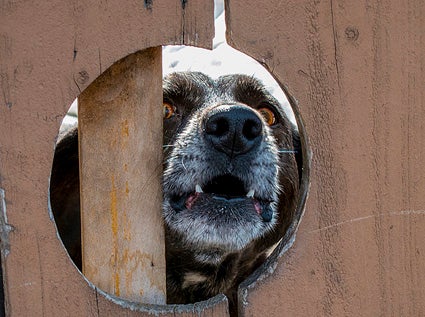How to Condition Your Dog to Loud Noises

Loud noises can be startling when you aren’t expecting them, but you probably recover from your surprise fairly quickly. For dogs suffering from noise anxiety, however, this may not be the case. Loud noises can cause extreme anxiety and fear which can progress to behavioral changes or other problems. If your dog has a dislike for loud noises, you may be able to solve the problem with some conditioning.
Understanding Noise Anxiety in Dogs
It is completely normal for your dog to get a little startled by an unexpected loud noise, but what if your dog is reduced to a shaking, whimpering mess at the sound of thunder or a car backfiring outside? Noise anxiety is fairly common in dogs but many owners fail to recognize the severity of the problem. Loud noises may cause your dog to tremble or hide – it could even cause him to go tearing around the house in an uncontrolled panic. Some dogs with noise anxiety develop behavioral problems such as destructive chewing, urinating or defecating indoors, or even making attempts at escape (and potentially injuring themselves in the process).
In some cases, it is difficult to pinpoint the cause of a dog’s anxiety. For example, if your dog becomes nervous when you pull out your camera, he could be frightened not of the flash, but of the shutter noise. It is more common, however, for dogs to develop noise anxiety related to a particular traumatic event such as being too close to a fireworks show or being stuck outside during a thunderstorm. You should also know that certain breeds have a predisposition to developing noise anxiety – these breeds may include Golden Retrievers, German Shepherds, and Collies. In these and other breeds, noise anxiety can begin gradually and worsen over time or it may be something your dog developed as a puppy.
Conditioning Your Dog to Loud Noises
When your dog becomes terrified during a thunderstorm or in the presence of some other noise, it can be tempting to coddle him in an effort to reduce his terror. According to experts, however, this is the very last thing you want to do if you want to resolve your dog’s noise anxiety. If you cuddle or console your dog when he becomes afraid of a noise, you are simply telling him that there is indeed something to be frightened of – you are reinforcing his fear response. The most effective treatment option for noise anxiety in dogs typically involves desensitizing your dog to the noise through conditioning.
To desensitize your dog to loud noises you will want to find a recording of the noise he fears most – this may be the sound of fireworks, thunder, or other loud noises. Start by keeping your dog in a closed room with you and the recording – you should also keep plenty of treats on hand. Start by playing the recording at a low volume then, after about 5 minutes, turn the volume up a little bit but not enough to induce a fear response. While your dog is still calm, feed him tasty treats every 30 seconds or so – this will help to reduce his negative association with the noise. After a few more minutes, turn up the volume again and keep doing this until your dog exhibits a fear response. Keep the recording at this volume and wait for your dog to calm down on his own - as soon as he does, praise him and reward him with a few treats.
By following this sequence, you can slowly increase the volume of the recording and, in doing so, reduce your dog’s fear response. The key is to transition very slowly so your dog doesn’t have a severe fear reaction at any point – you simply want him to get a little bit nervous but not so terrified that he cannot calm himself down. The process of desensitization may take some time so just be patient with your dog and be generous with the treats!
Photo credit: Bryan Jones/Flickr
Please consult the services of a Professional Dog Trainer, Behaviorist or Veterinarian before implementing any of the advice contained on this site.










 Your Privacy Choices
Your Privacy Choices